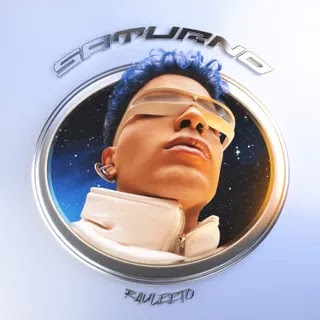With an eclectic mosaic of sounds across 1980s and ’90s freestyle, Miami bass, house, and old-school reggaeton, the Puerto Rican star’s new album delivers floor-fillers that actually try something different.
Do celebrities dream of BeReal? On “Dime Quién????,” a would-be standard heartbreak track, Rauw Alejandro gets uncomfortably real as he recalls the terror of seeing an ex with someone else on the supposedly low-pressure social app for candid photos. In the song’s video, he skulks around New York like he’s caught in The Matrix. He’s broached these topics in his music before, but this time, Alejandro’s confessional is a synth-powered reggaeton spaceship. And while the science-fiction concept of his new album SATURNO doesn’t ever fully solidify, it doesn’t need to. Combined with Alejandro’s charisma, the record’s eclectic mosaic of throwback sounds across 1980s and ’90s freestyle, Miami bass, house, and old-school reggaeton proves there’s room to innovate in pop reggaeton yet.
Latin pop has ventured into space recently. On 2018’s “Yo Le Llego,” from his collab album with J Balvin, Bad Bunny introduced himself as “Benito Antonio Martínez Ocasio, directamente del espacio” (“direct from space”). Ozuna’s Nibiru (2019), titled after a fictional planet, didn’t quite reach the heights promised by the extra-galactic premise. In each case, these Goliaths sought to prove their singular merit against the most popular backbeat in the world. While neoperreo artists have long embraced the digital sounds of the other in service of a liberatory cyberpunk vision, it’s rare to see pop reggaeton enter similar territory.
In a mainstream Latin music industry that favors a proven formula, popetón doesn’t often pair a big, extraterrestrial concept with an experimental sound to match, even if the concept doesn’t aspire to much beyond another “we’re in space now” aesthetic. With his 2021 single “Todo de Ti,” Alejandro led the Latin pop push into disco retrofuturism; the subsequent Vice Versa proved his dexterity in crafting an album, rather than a collection of songs. Fans of Spanish-language pop, often condescended to by the industry, crave experimentation. “¿Cuándo Fue?,” Vice Versa’s foray into drum’n’bass, signaled that Alejandro was prepared to use a new toolbox not only to surprise, but to underline the emotional potency of his lyrics.
With a trusty production crew (including Alejandro’s own producer alias, El Zorro), SATURNO’s landscape of synths, snares, and samples is airtight—ripe for scene-setting and narrative, if that were the artist’s intention. Instead Alejandro succeeds on vibe alone, delivering floor-fillers that actually try something different, from chiptune loops to hyperpop inflections, and calling on references and collaborators who represent authorities in their genres. “Punto 40” feels lab-created, TikTok trend and all, by expert Latin pop scientists, teaming Alejandro with veteran Baby Rasta for a digitized iteration of Baby Rasta & Gringo’s 1998 track “Tengo Una Punto 40.” “Más De Una Vez” infuses a dreamy sample of Spanish singer Susana Estrada’s 1981 pop track “Gózame Ya.” On “Cazadores,” his collaboration with reggaeton and Latin trap titan Arcángel, a darkwave outro scores Alejandro’s claim to multi-genre fluency: “Listen to me/Nosotros fronteamos en cualquier ritmo” (“We front in whatever rhythm”). “Corazón Despeinado” combines a singsong chorus, a bridge born for rock en español, and a dance-punk beat, all illustrating the same romantic desperation: “Puedo hacer mainstream o alternativo/Pero nunca la pego contigo” (“I can do mainstream or alternative/But I’ll never be a hit with you”).
For all its ambition, SATURNO isn’t consistently adventurous: A few tracks that could easily have been B-sides abandon the already loose concept in favor of straightforward pop reggaeton, and the earlier single “Lokera,” though exciting, feels tacked-on. While Alejandro is certainly capable of a more substantive concept, it’s the specificity of his experiments that make the best tracks work. “De Carolina,” dedicated to his hometown where reggaeton flourished in the ’90s, enlists legendary mixtape architect DJ Playero (who co-produced a few tracks across the album). Layering a nostalgic Playero 38 sample against sharp beat switches and the organic energy of crowd recordings, the track enacts a dynamic flow between new and old that keeps community at its center—the signifier of authentic reggaeton. Since its inception, the genre has been variably derided, criminalized, and defanged; it is rendered utterly toothless when played safe. If pop reggaeton has largely lost its sense of a good time, then Alejandro is kicking a soccer ball in space among the aliens. As true reggaeton duro becomes scarcer in supply, SATURNO charts a course to its pop future.



0 comments:
Post a Comment